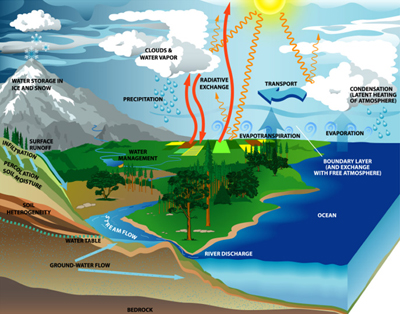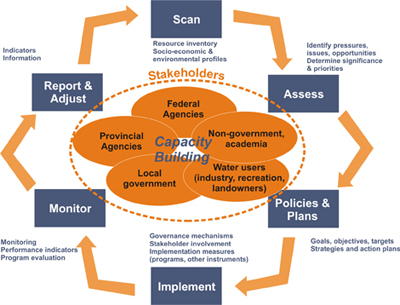
Introduction
Good governance can make a difference when it comes to managing the increasingly scarce water resources and the environment. Driven by increasing expectations of citizens and communities many governments and local authorities are investing in innovative ways to serve their clients better and more effectively.
Water Governance can be defined as the process of exercising authority over the public order and the promotion of sustainable development and common welfare. Its aim is to orderly rule, administer, direct, control and manage all water related societal processes. Water Governance embraces the relationship between society and its government, and encompasses all water related laws, regulations, institutions, policies, programs, actions, & networks of influence.
Good governance
Implementing good governance is a critical success factor shown by many studies; better governance leads to better performing governments. Our vision is that success of government programs should be measured by the true advantages they create for citizens, communities and industries. Many different stake holders create a demand in the short and long term for efficient and effective water resource management.
Water resource management programs are enabling governments to serve citizens at a higher level through greater efficiency, accessibility and responsiveness. At the same time, governments face increasing pressure to improve performance and accountability. At every level, government leaders seek to better understand the needs of their constituents and to deliver greater advantages for the citizens and communities they serve.

Water Partner provides a generic reference framework for good governance. A generic water governance model includes the different levels of governance by the different institutions in a certain country or region: ministries, water authorities, water companies. It is clear that good governance of water resource management programs uniquely qualify central and local authorities in addressing the needs of citizens. Good governance ensures needs are served efficiently, effectively and fairly. It accomplishes that goal by providing clear processes and structures for all aspects of executive management: decision-making, strategic and political alignment, managerial control and reporting, supervision and accountability.
Water Partner provides a generic reference framework for good governance. A generic water governance model includes the different levels of governance by the different institutions in a certain country or region: ministries, water authorities, water companies.

Main organizational levels
Water Partner’s reference framework gives a basis to assess governance practices in many different situations and produces directions for improvement. These directions for improvement are based on the principle guidelines included in our generic governance model :
- Promote impartial decision-makin
- Measure results related to overall strategic goals
- Be clear about procedures and outcome of planning, budgeting and operations
- Establish a clear relationship between activities, outputs and outcomes
- Always provide full transparency for critical activities and decisions
- Embrace performance measurement
Lessons learned in water governance
What is good water governance in practice, one may ask. Years of experiences have learned that it is possible to establish best practices for water governance. Best practices for water governance have been internationally formulated as follows:
- Monitoring and assessment mechanisms should be participatory and transparent.
- Good water governance entails:
- Efficient coordination of the institutions responsible for water management;
- Political will giving a clear mandate to the coordinating body
- The mandate and institutional basis of the coordinating body are decisive factors in ensuring the efficiency of its activities
- Governance is a repeated learning process which develops over time. It is a process which gains strength by drawing on both its failures and its successes
- The importance of adapting good governance to specific local conditions
- Good governance entails qualitative participation in the decision-making process by the major stakeholders and partners.
- Vital component in the steering of good water governance is identifying three levels of monitoring:
- Monitoring of the resource – quantity, quality and ecosystems;
- Monitoring the efficiency of policy and institutional arrangements;
- Monitoring user satisfaction.
- A mechanism for fostering public accountability must be set in motion so that monitoring and assessment will be based on indicators which can be measured.
